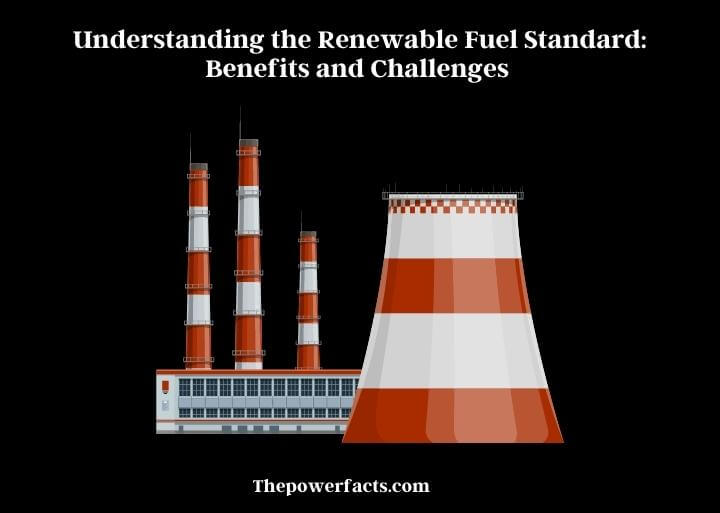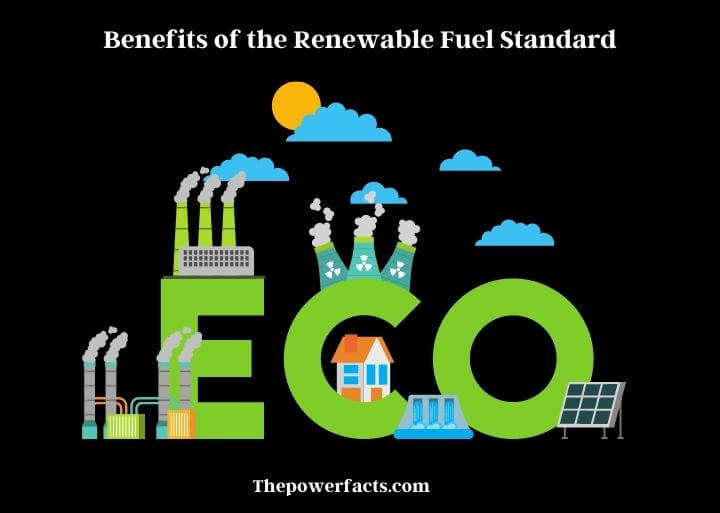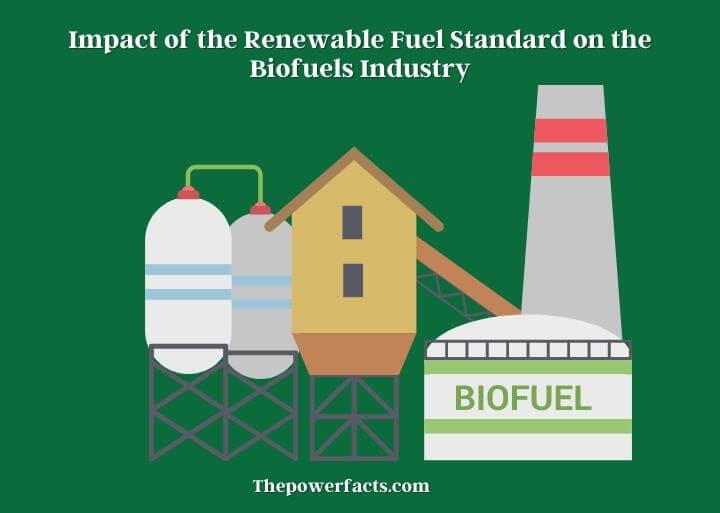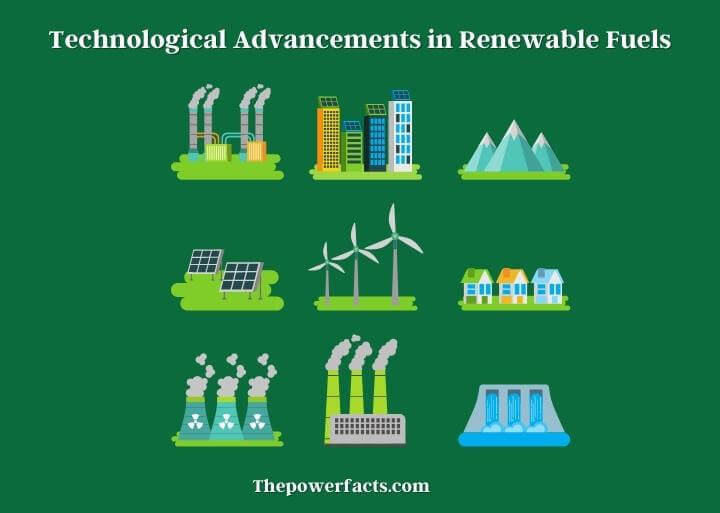The Renewable Fuel Standard (RFS) is a regulatory program established by the United States Environmental Protection Agency (EPA) in 2005. The program aims to promote the use of renewable fuels and reduce greenhouse gas emissions from the transportation sector. Under the RFS, transportation fuel sold in the U.S. is required to contain a certain percentage of renewable fuels, with the percentage increasing each year.

The program has sparked debates over its effectiveness, feasibility, and potential impact on various stakeholders.
What is the Renewable Fuel Standard?
The Renewable Fuel Standard is a regulation that requires transportation fuel sold in the United States to contain a certain percentage of renewable fuels. The percentage of renewable fuel required by the RFS increases each year, with the goal of increasing the use of renewable fuels and reducing greenhouse gas emissions from the transportation sector.
Benefits of the Renewable Fuel Standard
Reducing Greenhouse Gas Emissions
Renewable fuels, such as ethanol and biodiesel, have lower greenhouse gas emissions than traditional gasoline and diesel. By increasing the use of renewable fuels, the RFS helps reduce the amount of greenhouse gas emissions from the transportation sector.
Promoting Energy Independence
The use of renewable fuels reduces the amount of oil imported from foreign countries, which helps reduce the United States’ dependence on foreign oil.

Supporting the Rural Economy
The production of renewable fuels creates jobs in rural areas and helps support the agriculture industry.
Increasing Fuel Diversity
The use of renewable fuels provides a more diverse mix of fuel options, which helps reduce the risk of supply disruptions.
Challenges of the Renewable Fuel Standard
The Renewable Fuel Standard also faces several challenges, including:
Infrastructure Constraints
The current transportation fuel infrastructure is not designed to handle high concentrations of renewable fuels, which limits the amount of renewable fuels that can be blended into transportation fuel.
Blend wall
The “blend wall” refers to the point at which the amount of renewable fuels required by the RFS exceeds the amount that can be blended into transportation fuel without causing engine damage or performance issues. The blend wall has been a significant challenge for the RFS, as it has limited the amount of renewable fuels that can be blended into transportation fuel.
Food vs. Fuel Debate
The use of food crops, such as corn, to produce biofuels has sparked a debate about the trade-off between using land for food production and fuel production.
Impact of the Renewable Fuel Standard on the Biofuels Industry

Increased Demand for Biofuels
The RFS has created a market for biofuels, which has increased demand for ethanol and biodiesel.
Increased Production of Biofuels
The increased demand for biofuels has led to increased production of ethanol and biodiesel.
Innovation in Biofuels Technology
The demand for biofuels has spurred innovation in biofuels technology, leading to the development of new biofuels and production methods.
Key Components of the Renewable Fuel Standard
The Renewable Fuel Standard (RFS) consists of several key components, including Renewable Volume Obligations (RVOs), Renewable Identification Numbers (RINs), and the Small Refinery Exemption (SRE) program.
The RVOs are the annual targets for the amount of renewable fuels that must be blended into transportation fuel. These targets are set by the EPA each year and are based on the volume of transportation fuel projected to be sold in the following year. The RVOs are divided into four categories, each with its own volume requirement: cellulosic biofuel, biomass-based diesel, advanced biofuel, and total renewable fuel.
RINs are credits that are generated when a gallon of renewable fuel is produced or imported. These credits are used to track compliance with the RFS and are traded on a market, allowing obligated parties such as refiners and importers to meet their RVOs by purchasing RINs from other parties that have over-complied. RINs can also be carried over from year to year.
The SRE program allows small refineries with a production capacity of less than 75,000 barrels per day to apply for an exemption from meeting their RVOs. The exemption is granted if the refinery can demonstrate that compliance with the RFS would cause them disproportionate economic hardship.
Current Status of Renewable Fuel Standard
The Renewable Fuel Standard (RFS) has undergone several changes and challenges in recent years, affecting its current status.
In 2019, the EPA issued a final rule that set the RVOs for 2020 and 2021. The rule increased the RVOs for all categories except for biomass-based diesel, which remained the same. The rule also established new pathways for advanced biofuels such as renewable natural gas and renewable electricity. The rule was criticized by biofuel advocates for not doing enough to promote the use of higher ethanol blends, such as E15 and E85.
In 2020, the Tenth Circuit Court of Appeals issued a ruling that invalidated several SREs granted by the EPA, stating that the agency had overstepped its authority in granting the exemptions. This ruling was a win for biofuels advocates who argued that the SRE program had been abused by larger refineries seeking to evade their RFS obligations.
In January 2021, the EPA announced that it would be considering options to address the Tenth Circuit ruling, including potentially limiting the SRE program. This move was welcomed by biofuels advocates who have been pushing for reforms to the SRE program.
The Biden administration has also signaled a commitment to promoting renewable fuels and reducing greenhouse gas emissions from the transportation sector. The administration has pledged to support the development of biofuels and electric vehicles, as well as invest in infrastructure to support their deployment.
The current status of the RFS is one of ongoing changes and challenges, as stakeholders in the biofuels and transportation industries continue to advocate for their interests and the EPA seeks to balance these competing demands.
Technological Advancements in Renewable Fuels
Technological advancements have played a crucial role in the development and adoption of renewable fuels, making them more efficient, cost-effective, and sustainable.

Cellulosic Biofuels
One major breakthrough has been the development of cellulosic biofuels, which are made from non-food sources such as agricultural residues, woody biomass, and municipal solid waste. Cellulosic biofuels have the potential to reduce greenhouse gas emissions by up to 90% compared to gasoline. Advanced technologies such as enzymatic hydrolysis and gasification have made it possible to convert cellulosic feedstocks into biofuels at scale.
If you want to know about hydrogen production technologies, see here to know the process.
Algae-based Biofuels
Another promising technology is algae-based biofuels, which are derived from photosynthetic microorganisms that can be grown in a variety of environments, including wastewater and seawater. Algae-based biofuels have the potential to produce high yields of oil per acre and can be grown using non-arable land. Researchers are currently working on improving the efficiency and scalability of algae-based biofuels.
Renewable Natural Gas
Renewable natural gas (RNG) is a low-carbon fuel that is derived from organic waste such as food waste, agricultural waste, and wastewater. RNG can be used in natural gas vehicles and is considered a “drop-in” fuel, meaning it can be used in existing infrastructure without significant modifications. Recent advancements in RNG technology include the use of anaerobic digesters and landfills to capture methane emissions and convert them into RNG.
Electric Vehicles
While not a biofuel, electric vehicles (EVs) are another technology that has the potential to reduce greenhouse gas emissions from the transportation sector. EVs are powered by electricity and emit zero tailpipe emissions. Recent advancements in battery technology have made EVs more affordable and increased their driving range.
These technological advancements are expected to continue to drive innovation in the renewable fuels industry and help accelerate the transition to a more sustainable transportation system.
Wrap Up
The Renewable Fuel Standard (RFS) has played an important role in promoting the development and adoption of renewable fuels in the United States. The RFS has helped to reduce greenhouse gas emissions, increase energy security, and support rural economies. However, the RFS has also faced challenges and criticisms, particularly with regard to the small refinery exemption program and the slow pace of adoption of higher ethanol blends.
Despite these challenges, the renewable fuels industry has continued to make significant technological advancements that have improved the efficiency, sustainability, and cost-effectiveness of renewable fuels. Cellulosic biofuels, algae-based biofuels, renewable natural gas, and electric vehicles are all examples of technologies that have the potential to play a larger role in the transportation sector in the coming years.
As the world faces the pressing challenge of climate change, the need to transition to a more sustainable transportation system has become increasingly urgent. The RFS, along with continued technological innovation and policy support, can help to drive this transition and pave the way for a more sustainable future.